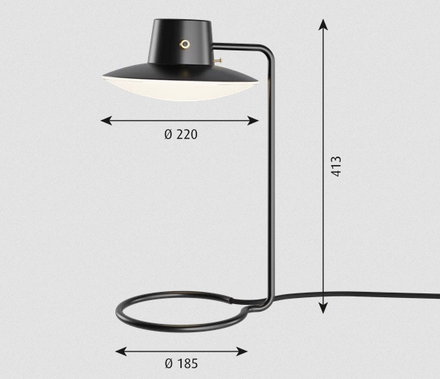Louis Poulsen AJ Oxford Table Lamp
AJ OXFORD TABLE LAMP
AJ OXFORD TABLE LAMP
Designed by Arne Jacobsen
This table lamp emits a pleasant downward directed light, which harmoniously illuminates the surface below it through the soft transparency of the three-layered mouth-blown opal glass. The variant without the top metal shade, the milky opal glass shade provides further glow to form an alluring halo around the fixture.
DESIGNER
ARNE JACOBSEN
Arne Jacobsen was born and raised in Copenhagen. In 1927, he graduated as an architect from the Royal Danish Academy of Fine Arts in Copenhagen.
After graduating, he obtained his first job at the office of the City Architect of Copenhagen launching his own office only two years later. Arne Jacobsen is a world famous Danish modernistic architect. His buildings are numerous in Denmark, Germany, and the United Kingdom.
Among his more famous projects are the National Bank in Copenhagen (1971), SAS Royal Hotel & Terminal, Copenhagen (1960), and St. Catherine’s College in Oxford, UK (1963). It is said that his fear of flying inhibited him from making a full impact on the American Architectural environment.
As an architect, Arne Jacobsen had very strong decision making skills, making it possible for him to influence not only the design of the building itself, but the majority of the details.
Over the years, he ventured into various fields related to his work, such as light fixtures, furniture, cutlery, door handles, sanitary fixtures, fabrics, and wallpaper patterns. "The Egg" and "The Swan" are two famous chairs designed by Jacobsen.
During Arne Jacobsen’s lifetime, he received several prestigious awards both at home and abroad. He became a professor at the Royal Danish Academy for 11 years and through that he influenced an entire generation of Danish Architects. Each eventually developed their own architectural language, built upon the same rationalistic and minimalist approach toward architecture.
FEATURES
INFORMATION
CLASS
Ingress protection IP20. Electric shock protection II.
WEIGHT
Max. 1.1 kg and 0.9 kg
PRODUCTION
Made in Denmark
DETAILS
Union nut and fingerscrew in untreated brass which will patinate. Pin solution for 410 mm with metal shade and 280 mm variants available upon request.
FINISH
Black wet painted stem with shade in three layered mouth-blown opal glass. Top shade: Black wet painted with white inner side.
LIGHT SOURCE
Light source 1x20W E14
DESIGNER
Arne Jacobsen
MOUNTING
-Cable type: Black textile cord 2x0.75 mm² with plug. -Cable length: 2.2m. -Light control: On/off switch on socket house with union nut in untreated brass. -Pin solution available for 410 mm: Cut-out dimension Ø44 mm, table thickness: 8 - 40 mm.
THE STORY BEHIND THE PRODUCT
The AJ Oxford Table Lamp has a sleek graphic expression, which reflects the architecture of St Catherine's College, in Oxford, for which it was originally designed. St Catherine's College, inaugurated in 1963, was designed by Arne Jacobsen in a modernist architectural style, which stands in contrast with the surrounding classical architecture of Oxford University. The AJ Oxford Table Lamp was first designed as a table pin lamp for the impressive dining hall at the college, which housed long rows of oak tables, seating 350 people. The table lamps act as centrepieces on the tables, while natural light comes from clerestory windows and the wall-mounted AJ Eklipta provides diffused general lighting. The lamp is still found at St Catherine's College, which is still in use today, both for teaching and as a halls of residence for students.
The AJ Oxford lamp, features a slim stem, similar to those of the AJ lamp collection, which seamlessly merges into the circular base. With its graphic style and monochrome colour palette, the AJ Oxford Table lamp is a timeless addition to any home. The table lamp is available in a few variants, both with or without the metal top shade and in two different heights, where the smaller one is ideal for compact spaces and sits perfectly on a shelf or windowsill. Additionally, the taller version is also available as a pin table lamp, as a testament to Arne Jacobsen's original design.










